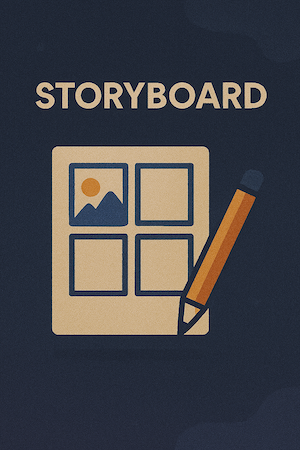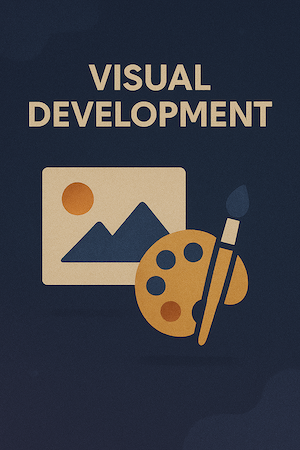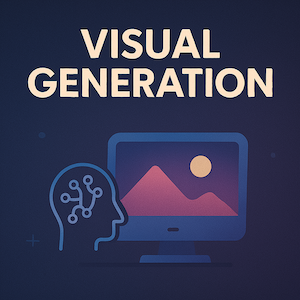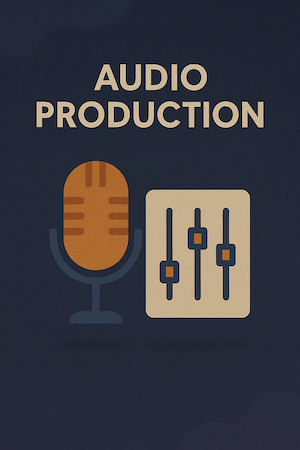Independent Filmmaker's Journey with AI Video
Case Study: How filmmaker Emma Chen used Compeller AI and other tools to create an award-winning short film with minimal budget

Filmmaker
Emma Chen
Project
"Echoes of Tomorrow" - 12-minute sci-fi short film
Challenge
Create a visually ambitious sci-fi film with virtually no budget
Solution
Hybrid approach using Compeller AI and traditional filmmaking
Results
Award-winning film created for less than $2,000, festival recognition
Background: The Independent Filmmaker's Dilemma
Emma Chen, a film school graduate with a background in screenwriting and cinematography, faced a common challenge for independent filmmakers: how to bring an ambitious creative vision to life with extremely limited resources. Her concept for "Echoes of Tomorrow" – a philosophical science fiction story exploring the relationship between humans and artificial intelligence – would traditionally require substantial visual effects, futuristic sets, and specialized equipment that were far beyond her budget.
After several unsuccessful attempts to secure funding through traditional channels, Emma began exploring how emerging AI technologies might help realize her vision without compromising on storytelling or visual quality.
"I had this story I was desperate to tell, but the quotes I was getting from VFX studios were more than ten times my total budget. I kept thinking there had to be another way to create compelling visual science fiction without millions of dollars. That's what led me to explore AI as a creative tool rather than just the subject of my film."
— Emma Chen, Writer-Director of "Echoes of Tomorrow"
The Challenge: Creating Cinema-Quality Sci-Fi on a Micro-Budget
Emma faced several specific challenges in bringing her film to life:
Visual Effects Requirements
The script called for futuristic cityscapes, holographic interfaces, and visualizations of AI consciousness that would typically require specialized VFX teams.
Production Design Limitations
Creating believable futuristic environments and props was financially out of reach with traditional production design approaches.
Technical Expertise Gap
As a solo filmmaker, Emma lacked the technical team typically required for effects-heavy production.
Festival-Quality Expectations
To be competitive in film festivals, the production value needed to meet certain standards despite the budget constraints.
The Solution: A Hybrid AI-Traditional Filmmaking Approach
After extensive research, Emma developed an innovative production methodology that combined AI-generated content with traditional filmmaking techniques:

AI-Enhanced Pre-Visualization
Emma used Compeller AI to create detailed visual references for each scene before filming:
- Generated complete storyboards for all 42 scenes
- Created visual concept art for characters, environments, and effects
- Developed mood boards and visual language for the film's aesthetic
- Produced animated previsualization for complex sequences

Hybrid Set Design
Combined minimal physical sets with AI-generated digital environments:
- Filmed actors against simple green screens in carefully lit environments
- Used Compeller AI to generate detailed futuristic environments
- Created digital set extensions that blended with practical elements
- Developed a consistent visual language between physical and digital elements

AI-Generated Visual Effects
Replaced traditional VFX pipeline with AI-generated elements:
- Created holographic interfaces using Compeller AI's animation capabilities
- Generated abstract visualizations of AI consciousness
- Developed futuristic technology and environments
- Produced seamless transitions between real and digital spaces

Audio-Synchronized Visuals
Leveraged Compeller AI's audio-reactive capabilities for key sequences:
- Created visual representations of the AI character's "thoughts" that reacted to its dialogue
- Developed dynamic environments that subtly responded to the film's score
- Generated transition sequences synchronized with sound design elements
- Produced an immersive climax sequence where visuals and audio were intrinsically linked
Key Advantage: Compeller AI's Iterative Capabilities
Emma found that Compeller AI's ability to quickly iterate on visual concepts was transformative for her creative process. Unlike traditional VFX that require significant time between iterations, she could explore numerous visual approaches in a single day, allowing for much more experimental and refined artistic choices.
Production Process: Redefining Independent Filmmaking
Emma's production process represented a significant departure from traditional filmmaking workflows:
-
Script Adaptation for AI Integration
Emma adapted her original screenplay to maximize the effectiveness of AI-generated elements, focusing on scenes where AI could create the greatest visual impact while planning intimate character moments for traditional filming approaches.
-
Visual Development Through AI
Rather than starting with concept artists, Emma used Compeller AI to explore dozens of visual directions for the film's aesthetics, allowing her to find a unique visual language that would have been cost-prohibitive through traditional means.
-
Minimalist Production Planning
With clear AI-generated visual references, Emma designed an extremely efficient 4-day shoot focused only on capturing the essential human elements of the story, with minimal crew and equipment needs.
-
Streamlined Principal Photography
The shoot focused exclusively on actors' performances against simple green screens, with precise lighting designed to match the pre-visualized AI environments.
-
Integrated Post-Production
Rather than separating editing and VFX as traditional workflows do, Emma used Compeller AI continuously throughout the editing process, generating and refining visual elements as the cut evolved.
-
Audio-Visual Synchronization
In the final stages, Emma used Compeller AI's audio-reactive capabilities to create a deeply integrated relationship between the film's sound design, music, and visual elements.
Results: Award-Winning Cinema on a Micro-Budget
The innovative hybrid approach yielded remarkable results:
"When we screened at festivals, most audience members assumed we had a budget in the hundreds of thousands. The judge at one festival refused to believe our budget figures until I showed him our production documentation. That moment crystallized for me just how transformative AI tools can be for independent filmmakers. We're entering an era where visual imagination no longer needs to be constrained by budget."
— Emma Chen, Writer-Director of "Echoes of Tomorrow"
Critical Scene Breakdown: "Consciousness Emergence"
One of the most striking sequences in the film shows the emergence of consciousness in the AI character. Emma's approach to this scene demonstrates the unique advantages of her hybrid methodology:
Conceptual Challenge
The scene needed to visualize an abstract concept—the birth of artificial consciousness—in a way that was both visually stunning and emotionally resonant.
Traditional VFX approach would have required:
- Specialized technical artists
- Complex particle simulations
- Weeks of rendering time
- Estimated cost: $15,000-25,000
Compeller AI Approach
Emma used Compeller AI's audio-reactive capabilities to create a visual representation of consciousness that directly responded to the film's score and sound design:
- Created 30+ visual variations to explore different metaphorical representations
- Developed a visual language that evolved throughout the sequence
- Generated visuals that synchronized perfectly with the musical score
- Actual cost: approximately $200 (platform subscription time)
Audience Impact
This scene received specific mention in festival reviews:
- "A breathtaking visualization of artificial consciousness unlike anything I've seen before." – Independent Film Review
- "The emergence sequence marries visual poetry with technological speculation in a way that rivals major studio productions." – SCI-FI Film Festival Judge
- "Proves that artistic vision, not budget, is the real currency of cinema." – Emerging Filmmaker Showcase
Creative Advantages
Beyond cost savings, the approach offered creative benefits:
- Enabled rapid iteration and experimentation with different visual concepts
- Allowed the visuals to be refined in response to evolving edit and sound design
- Created a more intuitive relationship between sound and image
- Produced a unique aesthetic that wasn't derivative of existing VFX styles
Challenges and Solutions
The innovative approach wasn't without its challenges:
Challenge: Integration Complexity
Creating seamless integration between live actors and AI-generated environments proved technically challenging.
Solution: Emma developed a lighting reference system during filming that precisely matched the lighting characteristics of the AI-generated environments, creating more natural integration between elements.
Challenge: Maintaining Directorial Vision
Ensuring the AI-generated elements precisely matched Emma's creative vision required careful prompt engineering.
Solution: Emma created a detailed visual "prompt bible" with specific terminology and reference images that consistently produced results aligned with her aesthetic direction.
Challenge: Technical Workflow
The iterative nature of working with AI-generated content created new workflow challenges in post-production.
Solution: Developed a modular editing approach where AI-generated sequences could be continuously refined while maintaining overall edit integrity.
Challenge: Artistic Ownership
Questions from festivals about the creative authenticity of AI-assisted filmmaking.
Solution: Emma transparently documented her creative process, demonstrating how AI functioned as a tool directed by her artistic vision, similar to how filmmakers use cameras and editing software.
Budget Breakdown
The project's budget demonstrated the dramatic cost advantages of the hybrid approach:
Critical Response and Industry Impact
Beyond the festival success, "Echoes of Tomorrow" generated significant discussion within the independent film community:
Awards Recognition
The film won Best Sci-Fi Short at the Independent Vision Film Festival, the Innovation Award at Future Cinema Showcase, and Best Visual Design at the Emerging Filmmaker Showcase.
Critical Commentary
Film critics specifically noted how the project challenged assumptions about budget requirements for visual storytelling, with one reviewer calling it "a democratizing moment for visual cinema."
Industry Panels
Emma was invited to speak on three film festival panels about the future of independent production, where she demonstrated her AI-hybrid methodology.
Educational Impact
Two film schools have incorporated case studies based on "Echoes of Tomorrow" into their curriculum on emerging production methodologies.
Filmmaker's Reflection and Future Directions
Emma's experience with AI-assisted filmmaking has shaped her perspective on the future of independent cinema:
"What excites me most isn't just the cost savings, though that's certainly significant. It's how tools like Compeller AI are changing the relationship between imagination and feasibility in filmmaking. Stories that would have been impossible for independent filmmakers to tell visually are now within reach. We're seeing a democratization of visual storytelling that could be as significant as what digital cameras did for independent cinema in the early 2000s."
— Emma Chen, Writer-Director of "Echoes of Tomorrow"
Based on her experience, Emma is now developing several new projects that further explore the potential of AI-human creative collaboration:
Feature Film Development
Emma is currently writing her first feature film, designed from the ground up to utilize AI-hybrid production methods, with a focus on creating immersive visual storytelling on an independent budget.
Workshop Development
She's creating a workshop series for independent filmmakers on integrating AI tools into traditional production workflows, with a focus on enhancing rather than replacing traditional filmmaking craft.
New Visual Language Exploration
Emma is particularly interested in how AI tools can help develop entirely new visual languages for cinema that aren't constrained by traditional VFX approaches or physical production limitations.
Interactive Narrative
Exploring how Compeller AI's real-time capabilities might enable new forms of interactive or responsive cinema where visual elements dynamically adapt to audience input or environmental factors.
Key Takeaways for Filmmakers
Emma's experience offers several valuable insights for other independent filmmakers:
Script With AI Capabilities in Mind
Writing with an understanding of AI's strengths and limitations can help maximize visual impact while minimizing production challenges.
Develop a Visual Language Early
Using AI tools during pre-production to establish a consistent visual aesthetic ensures cohesion throughout the production process.
Focus on Integration Planning
The greatest challenge in hybrid production is creating seamless integration between human and AI-generated elements. Careful planning around lighting, camera movement, and composition is essential.
Rethink Traditional Workflows
AI-hybrid production often works best with more fluid boundaries between pre-production, production, and post-production than traditional filming approaches.
Reimagine What's Possible in Independent Filmmaking
Explore how Compeller AI can help bring your cinematic vision to life regardless of budget constraints.